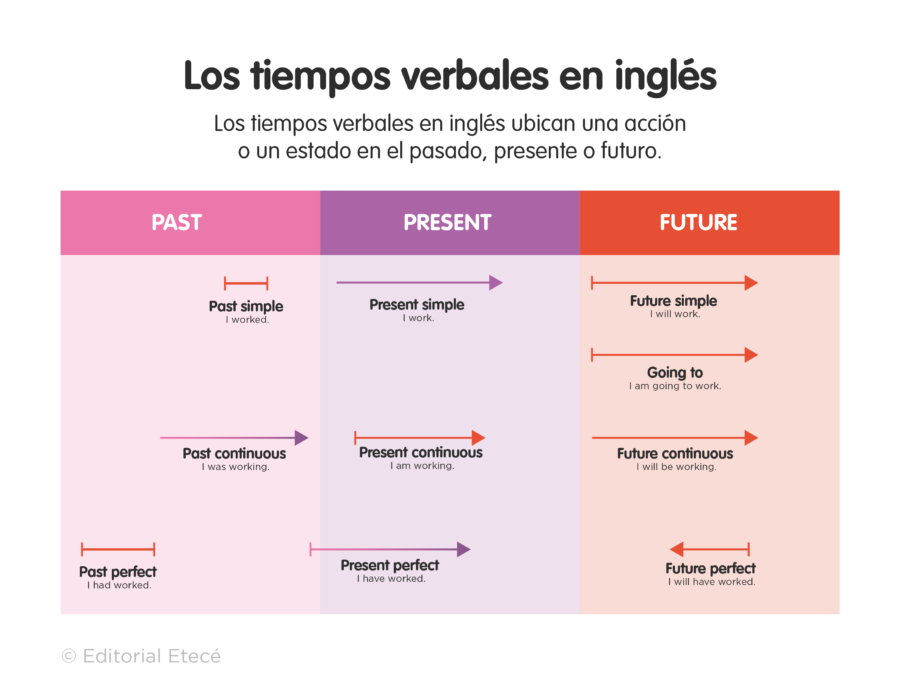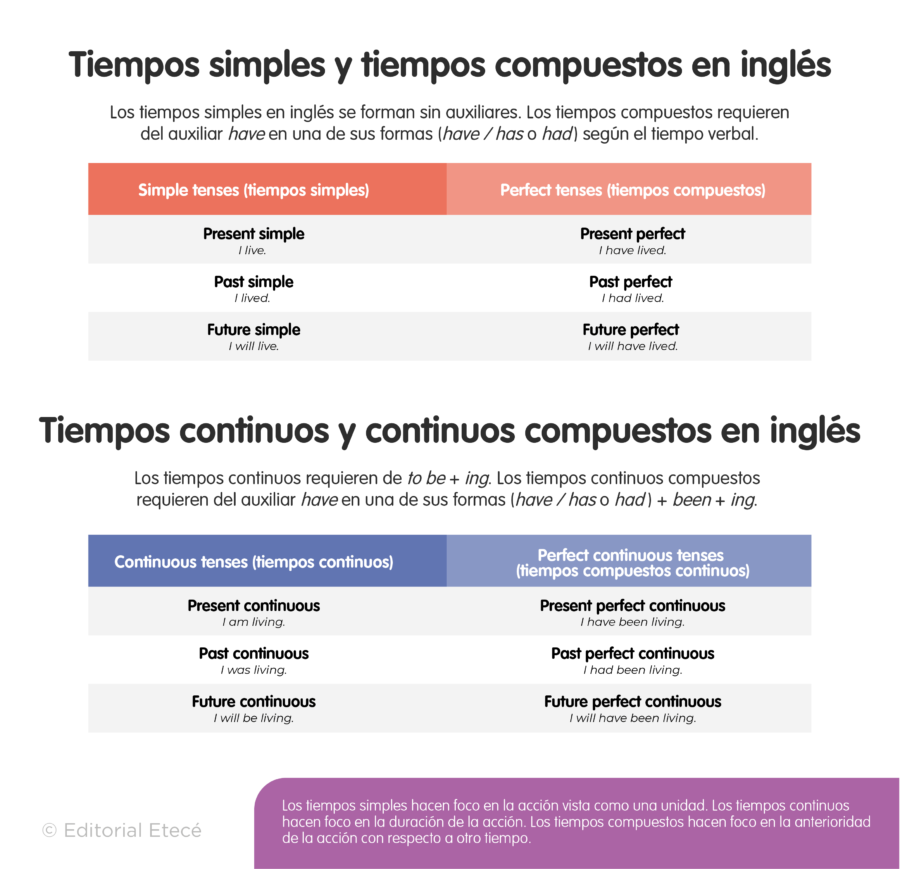Índice
El present continuous es un tiempo verbal en inglés que se utiliza para expresar acciones que están ocurriendo en el momento. Por ejemplo: I am studying for the test. / Estoy estudiando para el examen.
El present continuous también sirve para expresar acciones que están agendadas en el futuro. Por ejemplo: They are traveling to London in two weeks. / Ellos van a viajar a Londres en dos semanas.
El present continuous tiene carácter temporario, a diferencia del present simple, que tiene carácter permanente. Por ejemplo:
- She’s reading a good novel. / Ella está leyendo una buena novela. (Present continuous: carácter temporario)
- She always reads a lot. / Ella siempre lee mucho. (Present simple: carácter permanente)

Oraciones afirmativas en present continuous
- The dog is playing with a ball.
El perro está jugando con una pelota. - The meal is burning!
¡Se está quemando la comida! - It is getting late.
Se está haciendo tarde. - I’m going to bed.
Me voy a dormir. - My friends are coming over for dinner on Saturday.
Mis amigos vienen a cenar el sábado. - Ariana Grande is recording a new album.
Ariana Grande está grabando un nuevo álbum. - My sister is learning English.
Mi hermana está aprendiendo inglés. - You are driving too fast!
¡Estás manejando demasiado rápido! - Someone is knocking at the door.
Alguien está llamando a la puerta. - Mel and Stan are getting to know each other.
Mel y Stan se están conociendo. - Paula is studying physics at university.
Paula está estudiando física en la universidad. - The teacher is writing the explanation on the board.
La profesora está escribiendo la explicación en el pizarrón. - I’m running late.
Llego tarde. - Mom is talking on the phone right now.
Mamá está hablando por teléfono ahora. - I’m going out with Peter.
Estoy saliendo con Peter. - They are planning a trip to Disney.
Están planeando un viaje a Disney. - The firemen are trying to put out the fire.
Los bomberos están tratando de apagar el incendio. - I’m missing you like crazy!
¡Te estoy extrañando como loco! - They are looking at the photos from her trip to the US.
Están mirando las fotos de su viaje a USA. - The children are playing hide and seek.
Los niños están jugando a las escondidas. - The phone is ringing; can you get it?
El teléfono está sonando; ¿puedes atenderlo? - We are going on vacation next week.
Nos vamos de vacaciones la semana que viene. - Mary’s looking for a job.
Mary está buscando trabajo. - We are heading up the east coast next.
Nos dirigimos a la costa este a continuación. - My brother is listening to music in his bedroom.
Mi hermano está escuchando música en su habitación. - Jake is having a shower.
Jake está tomando una ducha. - I’m tidying up my room.
Estoy ordenando mi habitación. - Sorry, I can’t talk right now; I’m driving.
Perdón, no puedo hablar ahora; estoy manejando. - It is starting to drizzle.
Está comenzando a lloviznar. - They’re sitting by the fire.
Están sentados junto al fuego. - They’re laughing their heads off.
Se están riendo a carcajadas. - I’m begging you!
¡Te lo suplico! - I’m hanging in there.
Estoy aguantando. - I’m sending you all my love.
Te mando todo mi amor.

Oraciones negativas en present continuous
- The elevator is not working.
El ascensor no funciona. - It isn’t snowing.
No está nevando. - He isn’t paying attention.
Él no está prestando atención. - Kevin is not sleeping well these days.
Kevin no está durmiendo bien estos días. - You are not following the instructions carefully.
No estás siguiendo las instrucciones cuidadosamente. - I’m not staring at you.
No te estoy mirando fijamente. - Your English is not improving.
Tu inglés no está mejorando. - I’m not taking a break.
No estoy tomando un descanso. - Scott isn’t lying.
Scott no está mintiendo. - Those people aren’t speaking Welsh.
Esas personas no están hablando galés. - I am not feeling tired.
No me siento cansada. - You’re not trying hard enough.
No te estás esforzando lo suficiente. - I’m not being selfish.
No estoy siendo egoísta. - The water is not boiling yet.
El agua no está hirviendo. - The baby is not making a mess with his food.
El bebé no está haciendo lío con su comida. - The relation between the two countries is not getting better.
La relación entre los dos países no está mejorando. - I’m not leaving without you.
No me voy sin ti. - You’re not making much progress.
No estás haciendo mucho progreso. - Mike isn’t playing video games.
Mike no está jugando videojuegos. - He is not telling you the truth.
Él no está diciendo la verdad. - They‘re not singing out of tune.
No están cantando fuera de tono. - I’m not thinking about him.
No estoy pensando en él. - We’re not mixing things up.
No estamos confundiendo las cosas. - I’m not going to school today.
Hoy no voy a la escuela. - Derek isn’t attending the lecture on Thursday.
Derek no va a asistir a la conferencia el jueves. - Liz isn’t visiting her family this weekend.
Liz no va a visitar a su familia este fin de semana. - I’m not bringing anyone with me to the concert.
No voy a llevar a nadie conmigo al concierto. - The team is not playing well.
El equipo no está jugando bien. - I am not watching the news live.
No estoy mirando las noticias en vivo. - He is not being irresponsible.
Él no está siendo irresponsable. - We are not having any issues for the moment.
No estamos teniendo problemas por el momento. - I am not speaking with my mouth full.
No estoy hablando con la boca llena.
Preguntas en present continuous
- What are they doing?
¿Qué están haciendo? - Are you listening to me?
¿Me estás escuchando? - Where is he going?
¿A dónde está yendo? - Who is calling?
¿Quién llama? - Is she having a good time?
¿La estás pasando bien? - Are you coming to my party on Friday?
¿Vienes a la fiesta el viernes? - Is it raining?
¿Está lloviendo? - Who are they waiting for?
¿A quién están esperando? - Are you feeling very homesick?
¿Extrañas tu hogar? - Why are they laughing?
¿Por qué se están riendo? - Who is singing?
¿Quién está cantando? - Are you leaving already?
¿Ya te vas? - What are you looking at?
¿Qué estás mirando? - Is Matt going to the movies tonight?
¿Matt va ir al cine esta noche? - Are you sitting here?
¿Estás sentado aquí? - Why is the girl crying?
¿Por qué está llorando la niña? - Is the doorbell ringing?
¿Está sonando el timbre? - Why aren’t you coming with us?
¿Por qué no vienes con nosotros? - Are you talking to me?
¿Me estás hablando a mí? - What are you cooking?
¿Qué estás cocinando? - Who is he dating?
¿Con quién sale él? - Are you suggesting that we increase our offer?
¿Estás sugiriendo que aumentemos nuestra oferta? - Which hotel are you staying at?
¿En qué hotel te hospedas? - Are the girls sunbathing by the swimming pool?
¿Las niñas están tomando sol? - What are you reading?
¿Qué estás leyendo? - Are you enjoying it?
¿Lo estás disfrutando? - Where are you going on vacation?
¿A dónde vas a ir de vacaciones? - Who are you traveling with?
¿Con quién vas a viajar? - Are you seeing much wildlife during your trip?
¿Estás viendo mucha vida salvaje durante tu viaje? - What are you saying?
¿Qué estás diciendo? - Are they making chocolate chip pancakes for breakfast?
¿Van a hacer panqueques con chips de chocolate para el desayuno? - Why are they following us?
¿Por qué nos están siguiendo? - Are you still eating?
¿Todavía estás comiendo? - Are they waiting in line?
¿Están esperando en la fila?
Sigue con:
- Oraciones interrogativas en inglés
- Oraciones en «present perfect»
- Oraciones en «present simple»
- Oraciones en «future simple»
- Verbos terminados en -ed
- Oraciones en «past simple»





¿Te fue útil esta información?
Sí No¡Genial! gracias por visitarnos :)